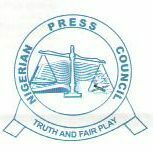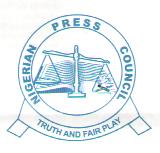A two-day workshop on “Effective Coverage and Reportage of 2015 General Elections” organized by the Nigerian Press Council (NPC), with the support of the Democratic Governance for Development (DGD) Project II of the United Nations Development Programme (UNDP).
The workshop was the sixth in the series organized by the NPC as part of its on-going efforts to train journalists in the six geo-political zones of the country in the best practices for election reportage. The objectives were to sensitize journalists on ethical principles guiding elections reporting and coverage; strengthen the capacity of journalists to monitor elections and report them effectively; and ensure adherence to professionalism as a deliberate means of entrenching democracy and good governance in Nigeria.
The workshop was attended by 65 participants consisting of the academia, officers from the Ministry of Information and journalists from both print and broadcast media organisations in the six states of the South-West geo-political zone – Ekiti, Lagos, Ogun, Ondo, Osun and Oyo.
A keynote address was presented by Prof. Attahiru Jega, Chairman, Independent National Electoral Commission (INEC), represented by Mr. Kayode Idowu, Chief Press Secretary to the INEC chairman. He stated that the media is a critical stakeholder in the electoral process. The INEC Chairman urged the media to abide by the established ethical and legal provisions, so as to effectively play their role in promoting free, fair and credible elections. He stated that the Commission has not received any communication on postponement of the forth coming general elections; therefore, the status quo remains.
The Honourable Commissioner for Information and Strategy, Lagos State, Hon. Lateef Aderemi Ibirogba, represented by Mrs. Toro Oladapo, who declared the workshop open, underscored the responsibility of the media to the people. He enjoined the media to emphasize issue based campaign and promote a peaceful election, devoid of acrimony. While acknowledging that there are inherent challenges confronting the media in electoral coverage, he however, urged the media to always display high ethical standard in their reportage.
Earlier in a remark, the Chairman of the workshop, Prof. Ralph A. Akinfeleye of the Department of Mass Communication, University of Lagos called for the promotion of journalistic integrity and ethics. He enjoined the media to avoid junk journalism but that the reportage of the 2015 elections should be based on truth and not affiliations.
The workshop featured eminent scholars and veteran media professionals as facilitators and Resource persons. Leading the presenters is Prof. Attahiru Jega, Chairman of Independent National Electoral Commission who is keynote Speaker. Others are Prof. Lai Oso of Lagos State University; Mr. George Izobo, former President of NUJ; and Kingsley Osadolor, Esq, Special Assistant to the Supervising Minister of Information.
The workshop embraced such themes as: INEC’s Expectation before, during and after the 2015 General Elections; the Role of the Media in Electoral Process; Professional Imperative of Focusing on Issues and Public Interest in Reporting the 2015 Elections and 2015 Elections: Expectations of the Media in Voters’ Education.
OBSERVATIONS:
It was observed that:
- Election is not just an event but a process involving many stages. The role of the media is therefore critical in making the electoral process a success.
- There are some inherent challenges confronting the media in the coverage of the electoral process.
- Undue influence of ownership, non provision of adequate welfare and security for media professionals in the course of their duties; challenges posed by the new and social media, among others, are some of the major constraints faced by Nigerian journalists.
- The central purpose of journalism is to provide citizens with accurate, factual and reliable information they need to function in a free society. The media therefore need to provide unfettered access to factual information on the electoral processes.
- Violence, assaults, kidnapping, detention and even killing of Journalists while carrying out their lawful duties are some of the professional hazards journalists are exposed to while covering the electoral process.
- Good journalism requires decent conduct that conforms with acceptable societal norms, values and ethical codes;
- Violent conflicts are obstacles to the conduct of free, fair and peaceful elections as they could lead to voters’ apathy and hinder the free performance of media roles and responsibilities during electoral processes.
RESOLUTIONS
Participants therefore recommend that:
- There is the need for media professionals as chief purveyors of information to embrace best professional practices, adhere to ethical standards and ensure factual, accurate and objective reporting at all times.
- Journalists should familiarize themselves with the extant laws which guide the electoral process, including the recently adopted ‘Nigerian Media Code of Election Coverage’.
- The Media should continue to provide impartial voter education as they relate to all processes of election. Voter education should not end with the casting of votes and subsequent announcement of results, the post-election environment also calls for voter education.
- There is the need for the protection of the rights of the media to freely access and disseminate authentic information on the electoral processes.
- The Press should continue to carry out its agenda building role or agenda setting function which is an important aspect in the process of formation of public opinion.
- There is need for more of analytical, interpretative and investigative journalism in election coverage and reportage.
- Media owners should refrain from undue influence and interference in the line of duties of the journalists. The over bearing attitude of media owners both private and public should be tackled to reduce their influence on journalists and enhance editorial independence.
- The media as moderators of the political discussion have the duty to interrogate politicians and their political parties on how the various promises embedded in their manifestoes would be actualized if voted into power.
- Journalists should refrain from the promotion of hate speech and other forms of incitement that could lead to violence and threaten smooth electoral process. Politicians are enjoined to eschew the use of hate language.
- Security agencies should be reminded that media professionals are critical stakeholders in the electoral process and need to be protected. Urged security agencies to make use of the initiative of the newly formed National Monitoring Network on Safety of Journalists to provide the necessary cover and protection for the safety of journalists during and after the elections.
- The welfare and proper remuneration of journalists should be given serious attention for purposes of enhancing efficient and effective performance.
- Media reportage of the 2015 elections must not be based on affiliations whether party, personal, ethnic, religion and other cultural influences in the society.
- Journalists to familiarize themselves with the Nigerian constitution as amended, the electoral act, the code of electoral coverage, the Code of ethics for journalist and other relevant codes.
- There is also the need for media to provide a level playing ground for all political parties and other candidates to air their opinions and reach out to electorates without bias.
The participants expressed gratitude to the NPC, DGD/UNDP and other donor agencies – European Union, UKaid and the Foreign Affairs, Trade and Development Canada for their efforts at providing the capacity building programme.
………………………….…………….. ……………………………………….
Prof. Ralph A. Akinfeleye Mr. Deji Elumoye
Chairman of Workshop Chairman, NUJ Lagos State Council
For: Participants
……..………………………………..
Mr. Nnamdi Njemanze
Executive Secretary, Nigerian Press Council

